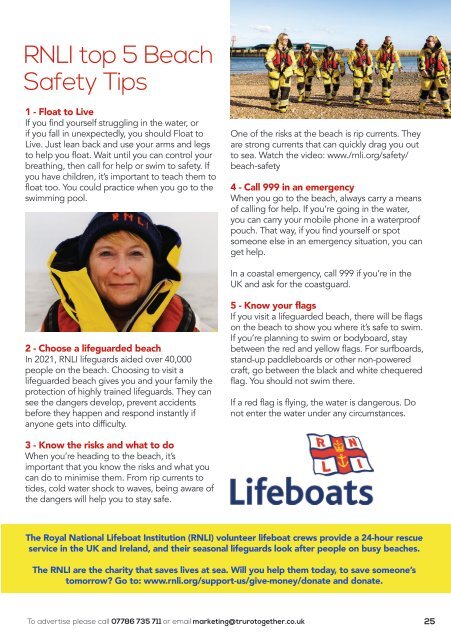Truro Together July August 2022
A local #community magazine containing community, business and charitable editorial in the the Truro, Cornwall area. 8,300 copies printed and hand delivered by Royal Mail to residences and businesses in TR1 1 and TR1 2 postal code areas. Copies available at Visit Truro Information Centre and Tescos in Truro.
A local #community magazine containing community, business and charitable editorial in the the Truro, Cornwall area. 8,300 copies printed and hand delivered by Royal Mail to residences and businesses in TR1 1 and TR1 2 postal code areas. Copies available at Visit Truro Information Centre and Tescos in Truro.
Create successful ePaper yourself
Turn your PDF publications into a flip-book with our unique Google optimized e-Paper software.
RNLI top 5 Beach<br />
Safety Tips<br />
1 - Float to Live<br />
If you find yourself struggling in the water, or<br />
if you fall in unexpectedly, you should Float to<br />
Live. Just lean back and use your arms and legs<br />
to help you float. Wait until you can control your<br />
breathing, then call for help or swim to safety. If<br />
you have children, it’s important to teach them to<br />
float too. You could practice when you go to the<br />
swimming pool.<br />
One of the risks at the beach is rip currents. They<br />
are strong currents that can quickly drag you out<br />
to sea. Watch the video: www./rnli.org/safety/<br />
beach-safety<br />
4 - Call 999 in an emergency<br />
When you go to the beach, always carry a means<br />
of calling for help. If you’re going in the water,<br />
you can carry your mobile phone in a waterproof<br />
pouch. That way, if you find yourself or spot<br />
someone else in an emergency situation, you can<br />
get help.<br />
In a coastal emergency, call 999 if you’re in the<br />
UK and ask for the coastguard.<br />
2 - Choose a lifeguarded beach<br />
In 2021, RNLI lifeguards aided over 40,000<br />
people on the beach. Choosing to visit a<br />
lifeguarded beach gives you and your family the<br />
protection of highly trained lifeguards. They can<br />
see the dangers develop, prevent accidents<br />
before they happen and respond instantly if<br />
anyone gets into difficulty.<br />
5 - Know your flags<br />
If you visit a lifeguarded beach, there will be flags<br />
on the beach to show you where it’s safe to swim.<br />
If you’re planning to swim or bodyboard, stay<br />
between the red and yellow flags. For surfboards,<br />
stand-up paddleboards or other non-powered<br />
craft, go between the black and white chequered<br />
flag. You should not swim there.<br />
If a red flag is flying, the water is dangerous. Do<br />
not enter the water under any circumstances.<br />
3 - Know the risks and what to do<br />
When you’re heading to the beach, it’s<br />
important that you know the risks and what you<br />
can do to minimise them. From rip currents to<br />
tides, cold water shock to waves, being aware of<br />
the dangers will help you to stay safe.<br />
The Royal National Lifeboat Institution (RNLI) volunteer lifeboat crews provide a 24-hour rescue<br />
service in the UK and Ireland, and their seasonal lifeguards look after people on busy beaches.<br />
The RNLI are the charity that saves lives at sea. Will you help them today, to save someone’s<br />
tomorrow? Go to: www.rnli.org/support-us/give-money/donate and donate.<br />
To advertise please call 07786 735 711 or email marketing@trurotogether.co.uk<br />
25















